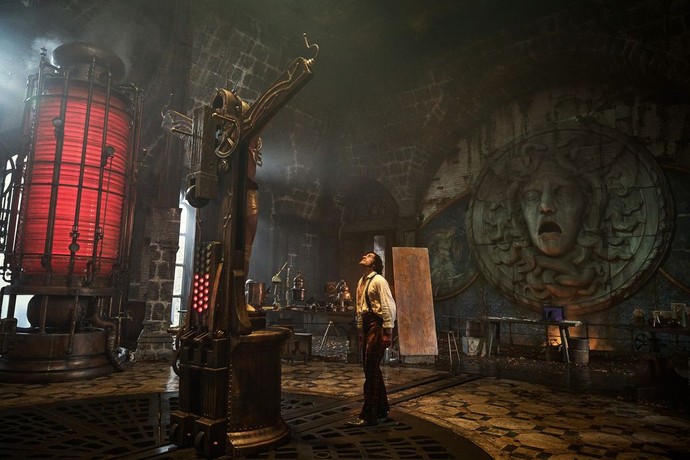In Frankenstein, Guillermo del Toro doesn’t ask for your fear—he asks for your compassion. It may be long, ornate, and at times overreaches, but damn if it doesn’t ache so damn beautifully.

In Frankenstein (2025), Guillermo del Toro offers a sweeping, gothic reimagining of Mary Shelley’s classic. Oscar Isaac commands as Victor Frankenstein—a driven genius haunted by his ambitions—and Jacob Elordi delivers a hauntingly human turn as his “monster,” a creation both compassionate and monstrous. Del Toro explores depth beyond horror: fatherhood, regret, and the redemptive power of forgiveness, all set against eerie, otherworldly beauty.
Review: Frankenstein (2025)
In a world dense with remakes and reboots, Guillermo del Toro’s Frankenstein feels like destiny finally fulfilled. This is not just another retelling—it is the summation of a lifetime steeped in monsters, myth, and the fragile, often brutal poetry of humanity. Clocking in at nearly two-and-a-half hours, the film unfolds like a dark fairy tale carved in ice and regret.
A Tale of Creation, Regret, and Reconciliation
Set in the mid-19th century, Frankenstein opens with winter-gray expanses and bookending scenes in the Arctic, as Victor Frankenstein (Oscar Isaac) recounts his journey into illusion and obsession. His creation (Jacob Elordi) emerges not as a lumbering horror, but as a tragic, almost holy figure—vulnerable, searching, and bewildered by a world that deems him intolerable. The narrative unfolds in lush flashbacks, mapping Victor’s fall from faith to fanaticism.
Del Toro said he wanted beauty in the creature—far from grotesque caricature, this being is “a gentle giant,” tortured by grief and longing for connection. The film is distinctly unwavering in its ambition: a gothic psychodrama in costume, mood, and meaning.
Performances That Strike the Soul
Oscar Isaac as Victor roils with flamboyant genius and buried sorrow. In a revealing EW interview, he framed Victor as equal parts scientist and rock-star, drawing inspiration from icons like Jimi Hendrix and Prince. Isaac’s Victor is brilliant, broken, and utterly human.
And then: Jacob Elordi. At Venice, his Creature stole the screen—and the headlines. Critics called his performance spellbinding, a revelation that turned the film’s emotional gears. He plays with frequency and anguish, voice and stillness, dogged by existential loneliness.
Supporting actors—including Mia Goth as Elizabeth and Christoph Waltz and Charles Dance in pivotal roles—set off Isaac and Elordi like constellations around a supernova.
Critical Pulse
The response at Venice was epic: an astonishing 13-minute standing ovation. Critics are split, though:
-
Vogue termed it a “tear-jerking fairy tale... visually stunning,” praising Elordi’s emotional depth.
-
Reuters highlighted del Toro’s choice of “beauty” in the creature’s design.
-
But some, like The Times, found it underwhelming despite the spectacle.
-
Others praised the craft and emotional stakes while questioning the tonal shifts and melodrama.
Description:
Guillermo del Toro’s Frankenstein reinvents Shelley’s legend as tragedy and beauty—Oscar Isaac and Jacob Elordi deliver heart-shaping performances in a gothic blowout that’s as emotionally rich as it is visually stunning.
| Attribute | Details |
|---|---|
| Genre | Gothic Sci-Fi Horror / Drama |
| Release Year | 2025 (Venice premiere Aug 30; limited theaters Oct 17; Netflix Nov 7) |
| Director | Guillermo del Toro |
| Screenwriter | Guillermo del Toro |
| Producers | Guillermo del Toro, J. Miles Dale, Scott Stuber |
| Starring | Oscar Isaac (Victor), Jacob Elordi (Creature), Mia Goth (Elizabeth), plus Felix Kammerer, Charles Dance, Christoph Waltz |
| Cinematography | Dan Laustsen |
| Editing | Evan Schiff |
| Music | Alexandre Desplat |
| Production Companies | Double Dare You, Demilo Films, Bluegrass 7 |
| Distributor/Studio | Netflix |
| Budget | $120 million |
| Runtime | 149 minutes |